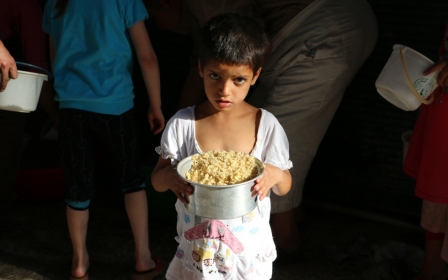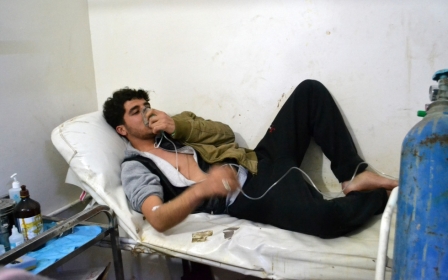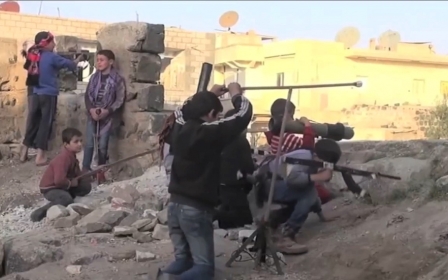Volunteers struggle to keep daily life afloat in southern Syria

AMMAN - As rebel groups and the Syrian army lock horns in fierce clashes, there’s another, silent war raging in southern Syria. It’s fought with shovels and along electrical lines.
While government snipers lurk on rooftops and airstrikes hail into the streets, a mixed-bag group of about 150 local volunteers dubbed the Syrian Civil Defence are picking up the pieces of what remains of the embattled southern city of Deraa.
Now the group is seeking funding opportunities like those enjoyed by their counterparts in the north, the White Helmets, who recently made international headlines for their recovery work after bombings in Aleppo.
Volunteers visited Amman in January to hold talks with the government and British backers, in a move aimed at getting equipment and training to carry out an ever-growing list of civil duties in their war-torn area. This month, they secured some $20,000 worth of funding for training and equipment from Turkish, British and Dutch backers, among others, who say more is on the way.
Back in 2011, the group started with garbage pickup.
“Initially it was just trash, but then the civilians slowly began requesting things like water and we started doing more,” Ahmad, the former Civil Defence’s head of management council who didn’t want his real name published for security reasons, told Middle East Eye. “Now we do pretty much everything.”
Ahmad blames his team’s difficulties in securing funding on isolation from the Turkey-based umbrella opposition group Syrian Opposition Coalition (SOC) and more stringent border policies maintained by the Jordanian government. Unlike in the north, where Turkish officials have allegedly kept a lax border policy with Syria, the passing of both equipment and people in and out of Jordan has been harder to come by.
Today, Syria’s southern front is defined by minimal gains and losses of Free Syrian Army factions and al-Qaeda’s branch in Syria, Jabat al-Nusra, against a national military force backed by foreign militias of its own. Against this backdrop, the Civil Defence juggles sanitation maintenance, distributes food and digs mass graves for the growing number of civilian casualties.
Like their northern counterpart, the southern civil defence group is made up of a neutral, unarmed batch of civilian volunteers, fighting to keep a teetering Deraa from a total collapse.
They’re not forging a battle driven by missiles and territory grabs, but their job is no less dangerous, a fact Ahmad knows all too well.
The 44-year-old left Deraa over a year ago, and barely got out alive.
It was the end of 2013, and Ahmad said government bombings were picking up steam in the southern city that was the bedrock of the revolution against Syrian President Bashar al-Assad just two years before. Deraa's infrastructure had fallen to the wayside and the Civil Defence volunteers began picking up where it left off, but it didn’t go unnoticed.
In November of 2013, Ahmad’s car exploded with him inside. He believes the device was rigged by a local group loyal to Assad.
“The bomb was under the passenger side of the car, but luckily enough, my car is very heavy,” he said, grinning.
He was taken across the Jordanian border to receive treatment in Jordan. On his cell phone, he keeps a grainy photo of the aftermath, showing a swollen face covered in deep purple bruises and engulfed in gauze.
But it wasn’t just the Syrian government that was after the Civil Defence workers, according to the volunteers; Nusra had also started closing in. As the Defence took control of the city’s infrastructure, they said the al-Qaeda group sought to control them, trying to buy them out at first with highly paid positions within their ranks.
When they refused, things got more heavy-handed.
“When we declined all their offers, we were subjected to direct threats,” Hussein al-Johamani, another volunteer, said.
The January visit was the first time al-Johamani set foot outside of Syria since the beginning of the conflict. Before the war he owned a kindergarten in Deraa. Ahmad was a handball coach. Like most of the Civil Defence team, neither entered their positions with any medical training.
Ahmad said they’ve been promised increased support from international parties working inside Jordan, but it’s been a tough road to convince the government.
“The people supporting the White Helmets [in the north] have had trouble [to do the same things] in Jordan. We have had a hard time trying to open an office here,” he said. “The SOC was sending all the support to the north, and we were forgotten in the south.”
But now Ahmad said the group’s been given permission to open an office in Jordan within the coming months, where they hope to facilitate the flow of equipment across the border.
Back in Deraa, time is running out for help to arrive. Al-Johamani said government airplanes are increasingly targeting civilian hotspots in rebel-held patches of the city and its provinces. Indiscriminate bombings and sniper attacks leave Deraa’s streets raw with fear, al-Johamani explained. He believes it’s part of a larger plan.
“The main problem we’re having is that the airplane attacks do not distinguish between civilians and the fighters,” he said. “Since they cannot hit [the rebels], instead they target civilians in their areas, to try and make them turn over fighters from the FSA.”
Inside the volatile landscape of the southern battlefield, warring groups are neck-and-neck in bloody clashes. Al-Johamani said the Defence coordinates civilian evacuation routes often with FSA factions, which formed a single body dubbed the First Army earlier this year and controls large swathes of Deraa.
Al-Johamani said the Defence hopes for similar coordination among other rebel factions to secure a civilian safe haven, and drive out hard-line groups from closing in.
“The First Army implementation is kind of like a safety valve to not allow more extremists inside,” he said. “With their formation, they want to coordinate more with the Civil Defence to bring more control back to the civilians.
In a battle fought for control of strategic hilltops and road passages, the Defence workers are caught in the middle, responding when the bombs fall and civilians flee. Fellow Defence volunteer Anas Albermawi said the volunteers bury Syrian government soldiers with the same procedures as the city’s fallen civilians. When soldiers decide to defect, a phenomenon Albermawi said has not slowed down in the south, the Defence comes to their aid as well.
“Anytime there is a clash, there is a massive defection,” he said. “Soldiers will lay down their weapons.”
Though the Amman meetings in January were one of the group’s first outside Syria, and continuing talks with international backers promise better equipment, more astute training and funding to keep up their daily duties, nothing has been launched yet for the Defence team. Ahmad said after this month’s talks, they expect to begin training some 300 new volunteers in Amman with the first batch starting at the end of March.
Sitting in a bright restaurant in Jordan’s northern city of Irbid, al-Johamani pulls up a photo on his mobile phone of Civil Defence workers standing before a row of holes in the ground, a scene that’s grown familiar to the volunteer crew, where civilian victims will be laid to rest.
Once, he said, they lost a volunteer to a government sniper, who shot at the man when he climbed up an electrical pole to re-attach fallen lines. Another time, government forces launched a rocket at one of the Defence’s sanitation vehicles while it swept up rubble from the streets.
“The regime does not distinguish between the elderly, the women, the young - this wound is from an airstrike attack,” he said, revealing fleshy pink scars across one of his arms and hand. “Right now, Deraa is dying.”
Middle East Eye propose une couverture et une analyse indépendantes et incomparables du Moyen-Orient, de l’Afrique du Nord et d’autres régions du monde. Pour en savoir plus sur la reprise de ce contenu et les frais qui s’appliquent, veuillez remplir ce formulaire [en anglais]. Pour en savoir plus sur MEE, cliquez ici [en anglais].




